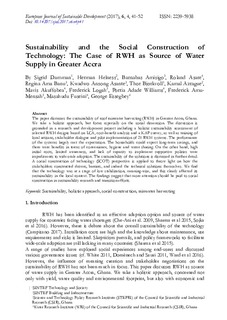Sustainability and the Social Construction of Technology: The Case of RWH as Source of Water Supply in Greater Accra
| dc.contributor.author | Damman, Sigrid | |
| dc.contributor.author | Helness, Herman | |
| dc.contributor.author | Amisigo, Barnabas | |
| dc.contributor.author | Asare, Roland | |
| dc.contributor.author | Banu, Regina Ama | |
| dc.contributor.author | Asante, Kwadwo Ansong | |
| dc.contributor.author | Bjørkvoll, Thor | |
| dc.contributor.author | Azrague, Kamal | |
| dc.contributor.author | Akuffobea, Mavis | |
| dc.contributor.author | Logah, Frederick | |
| dc.contributor.author | Williams, Portia Adade | |
| dc.contributor.author | Amu-Mensah, Frederick | |
| dc.contributor.author | Fuseini, Masahudu | |
| dc.contributor.author | Essegbey, George | |
| dc.date.accessioned | 2017-10-10T16:21:59Z | |
| dc.date.available | 2017-10-10T16:21:59Z | |
| dc.date.created | 2017-10-05T10:23:19Z | |
| dc.date.issued | 2017 | |
| dc.identifier.issn | 2239-5938 | |
| dc.identifier.uri | http://hdl.handle.net/11250/2459501 | |
| dc.description.abstract | The paper discusses the sustainability of roof rainwater harvesting (RWH) in Greater Accra, Ghana We take a holistic approach, but focus especially on the social dimension. The discussion is grounded in a research and development project including a holistic sustainability assessment of selected RWH designs based on LCA, cost-benefit analysis and a KAP survey, as well as training of local artisans, stakeholder dialogue and pilot implementation of 21 RWH systems. The performance of the systems largely met the expectation. The households could expect long-term savings, and there were benefits in terms of convenience, hygiene and water sharing. On the other hand, high initial costs, limited awareness, and lack of capacity to implement supportive policies were impediments to wide-scale adoption. The sustainability of the solutions is discussed in further detail. A social construction of technology (SCOT) perspective is applied to throw light on how the stakeholders constructed drivers, barriers, and indeed the technical solutions themselves. We find that the technology was at a stage of low stabilization, meaning-wise, and this clearly affected its sustainability in the local context. The findings suggest that more attention should be paid to social construction in sustainability research and transition efforts. | nb_NO |
| dc.language.iso | eng | nb_NO |
| dc.rights | Attribution-NonCommercial-NoDerivatives 4.0 Internasjonal | * |
| dc.rights.uri | http://creativecommons.org/licenses/by-nc-nd/4.0/deed.no | * |
| dc.subject | Regnvann | nb_NO |
| dc.subject | Rain water | nb_NO |
| dc.subject | Helhetlig tilnærming | nb_NO |
| dc.subject | Holistic approach | nb_NO |
| dc.subject | Bærekraft | nb_NO |
| dc.subject | Sustainability | nb_NO |
| dc.subject | Social construction | nb_NO |
| dc.subject | Rainwater harvestin | nb_NO |
| dc.title | Sustainability and the Social Construction of Technology: The Case of RWH as Source of Water Supply in Greater Accra | nb_NO |
| dc.type | Journal article | nb_NO |
| dc.type | Peer reviewed | nb_NO |
| dc.description.version | publishedVersion | nb_NO |
| dc.rights.holder | © 2017 The authors | nb_NO |
| dc.rights.holder | © 2017 European Center of Sustainable Development. | |
| dc.subject.nsi | VDP::Teknologi: 500 | nb_NO |
| dc.subject.nsi | VDP::Technology: 500 | nb_NO |
| dc.subject.nsi | Rainwater harvestin | nb_NO |
| dc.source.pagenumber | 41-52 | nb_NO |
| dc.source.volume | 6 | nb_NO |
| dc.source.journal | European Journal of Sustainable Development | nb_NO |
| dc.source.issue | 4 | nb_NO |
| dc.identifier.doi | 10.14207/ejsd.2017.v6n4p41 | |
| dc.identifier.cristin | 1502427 | |
| cristin.unitcode | 7401,60,20,0 | |
| cristin.unitcode | 7401,30,30,0 | |
| cristin.unitname | Anvendt økonomi | |
| cristin.unitname | Infrastruktur | |
| cristin.ispublished | true | |
| cristin.fulltext | original | |
| cristin.qualitycode | 1 |
Tilhørende fil(er)
Denne innførselen finnes i følgende samling(er)
-
Publikasjoner fra CRIStin - SINTEF AS [5850]
-
SINTEF Community [2270]
-
SINTEF Teknologi og samfunn [557]

